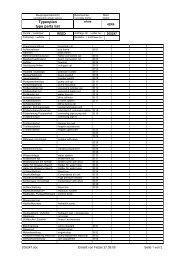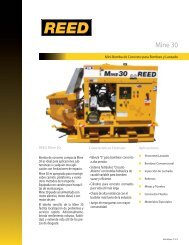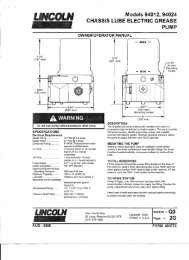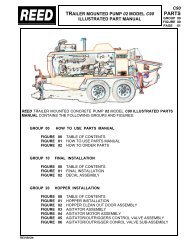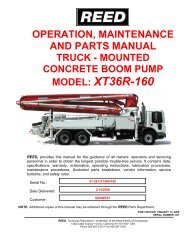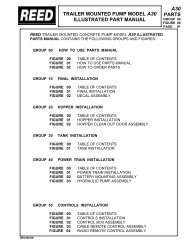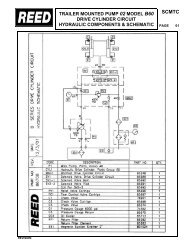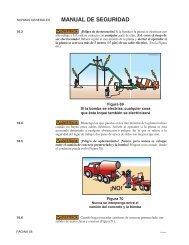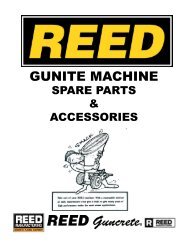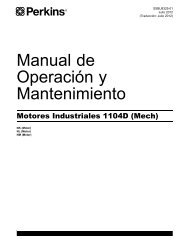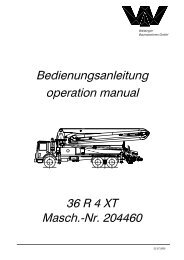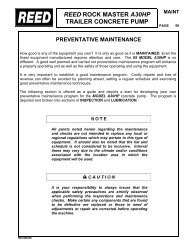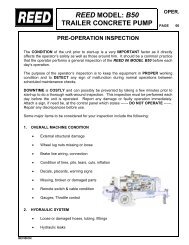Perkins Motor Operation and Maintenance Manual (English) - REED
Perkins Motor Operation and Maintenance Manual (English) - REED
Perkins Motor Operation and Maintenance Manual (English) - REED
You also want an ePaper? Increase the reach of your titles
YUMPU automatically turns print PDFs into web optimized ePapers that Google loves.
SEBU8325-01 75<br />
<strong>Maintenance</strong> Section<br />
Starting <strong>Motor</strong> - Inspect<br />
The operating environment, incorrect operating<br />
procedures <strong>and</strong> incorrect maintenance procedures<br />
can be factors which contribute to a severe service<br />
application.<br />
Environmental Factors<br />
Ambient temperatures – The engine may be<br />
exposed to extended operation in extremely<br />
cold environments or hot environments. Valve<br />
components can be damaged by carbon buildup if<br />
the engine is frequently started <strong>and</strong> stopped in very<br />
cold temperatures. Extremely hot intake air reduces<br />
engine performance.<br />
Quality of the air – The engine may be exposed<br />
to extended operation in an environment that is<br />
dirty or dusty, unless the equipment is cleaned<br />
regularly. Mud, dirt <strong>and</strong> dust can encase components.<br />
<strong>Maintenance</strong> can be very difficult. The buildup can<br />
contain corrosive chemicals.<br />
Buildup – Compounds, elements, corrosive<br />
chemicals <strong>and</strong> salt can damage some components.<br />
Altitude – Problems can arise when the engine is<br />
operated at altitudes that are higher than the intended<br />
settings for that application. Necessary adjustments<br />
should be made.<br />
Incorrect Operating Procedures<br />
• Extended operation at low idle<br />
• Frequent hot shutdowns<br />
• Operating at excessive loads<br />
• Operating at excessive speeds<br />
• Operating outside the intended application<br />
Incorrect <strong>Maintenance</strong> Procedures<br />
• Extending the maintenance intervals<br />
• Failure to use recommended fuel, lubricants <strong>and</strong><br />
coolant/antifreeze<br />
Starting <strong>Motor</strong> - Inspect<br />
i02678843<br />
<strong>Perkins</strong> recommends a scheduled inspection of the<br />
starting motor. If the starting motor fails, the engine<br />
may not start in an emergency situation.<br />
Check the starting motor for correct operation. Check<br />
the electrical connections <strong>and</strong> clean the electrical<br />
connections. Refer to the Systems <strong>Operation</strong>, Testing<br />
<strong>and</strong> Adjusting <strong>Manual</strong>, “Electric Starting System -<br />
Test” for more information on the checking procedure<br />
<strong>and</strong> for specifications or consult your <strong>Perkins</strong> dealer<br />
or your <strong>Perkins</strong> distributor for assistance.<br />
Turbocharger - Inspect<br />
(If Equipped)<br />
i02677378<br />
A regular visual inspection of the turbocharger is<br />
recommended. Any fumes from the crankcase are<br />
filtered through the air inlet system. Therefore,<br />
by-products from oil <strong>and</strong> from combustion can collect<br />
in the turbocharger compressor housing. Over time,<br />
this buildup can contribute to loss of engine power,<br />
increased black smoke <strong>and</strong> overall loss of engine<br />
efficiency.<br />
If the turbocharger fails during engine operation,<br />
damage to the turbocharger compressor wheel<br />
<strong>and</strong>/or to the engine may occur. Damage to the<br />
turbocharger compressor wheel can cause additional<br />
damage to the pistons, the valves, <strong>and</strong> the cylinder<br />
head.<br />
NOTICE<br />
Turbocharger bearing failures can cause large quantities<br />
of oil to enter the air intake <strong>and</strong> exhaust systems.<br />
Loss of engine lubricant can result in serious engine<br />
damage.<br />
Minor leakage of oil into a turbocharger under extended<br />
low idle operation should not cause problems as<br />
long as a turbocharger bearing failure has not occured.<br />
When a turbocharger bearing failure is accompanied<br />
by a significant engine performance loss (exhaust<br />
smoke or engine rpm up at no load), do not continue<br />
engine operation until the turbocharger is renewed.<br />
A visual inspection of the turbocharger can minimize<br />
unscheduled downtime. A visual inspection of the<br />
turbocharger can also reduce the chance for potential<br />
damage to other engine parts.<br />
Removal <strong>and</strong> Installation<br />
Note: The turbochargers that are supplied are<br />
nonserviceable.



